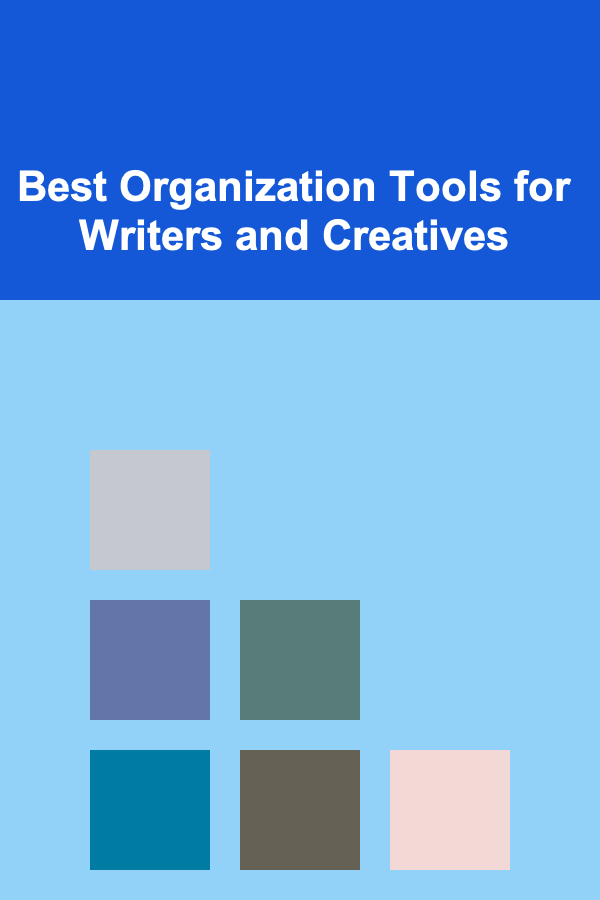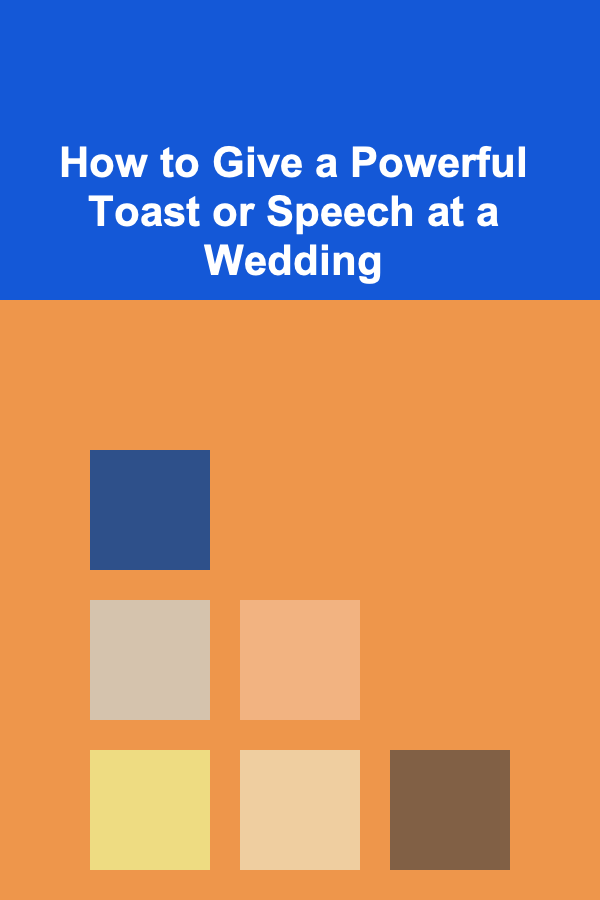
Best Organization Tools for Writers and Creatives
ebook include PDF & Audio bundle (Micro Guide)
$12.99$7.99
Limited Time Offer! Order within the next:

Creativity and organization are often seen as opposing forces---one thrives in chaos, while the other flourishes in structure. However, as any seasoned writer or creative professional knows, the right balance between the two can spark true productivity and innovation. When it comes to managing projects, keeping track of ideas, and staying on top of deadlines, organization tools become an invaluable asset. These tools help streamline creative workflows, making the process more efficient, focused, and rewarding.
In this article, we will explore the best organization tools for writers and creatives, diving into digital platforms, physical tools, and techniques that enhance creativity while providing the structure necessary to succeed. Whether you're a novelist, screenwriter, journalist, designer, or any other type of creative, these tools can transform your creative process, making it easier to stay organized, productive, and inspired.
Why Organization Matters for Writers and Creatives
Creativity doesn't exist in a vacuum. While it's true that some of the most brilliant ideas come from spontaneous moments of inspiration, the execution of those ideas requires structure. Writers and creatives need organization to manage various aspects of their work, such as:
- Idea Management: Writers often juggle multiple ideas at once, from characters to plot twists to themes. Creative professionals may need to keep track of sketches, drafts, or project notes. Without a system to organize these ideas, it's easy to lose track or feel overwhelmed.
- Project Tracking: Large creative projects often have many moving parts---deadlines, research, drafts, feedback, revisions. Without an effective way to track progress, creative projects can stall or spiral out of control.
- Time Management: Deadlines are often a critical component of creative work, whether you're a freelance writer with clients or an author working on a publishing deadline. Managing time effectively is crucial for completing work on time and avoiding burnout.
Organization tools can provide creative professionals with the framework they need to manage these tasks effectively, creating space for their creativity to flourish.
Digital Tools for Writers and Creatives
In today's fast-paced digital world, many writers and creatives rely on software and applications to stay organized. Digital tools offer immense flexibility and functionality that cater to a variety of creative needs. Here are some of the best digital tools for organization:
1. Scrivener: The Writer's Powerhouse
Scrivener is often considered the gold standard for writers who need to organize complex projects, such as novels, screenplays, or research-heavy works. It's a comprehensive writing software that allows users to create, organize, and edit their manuscripts in a flexible, customizable workspace.
Key Features:
- Organizing by Folders and Chapters: Scrivener's project structure is built around folders and subfolders, allowing writers to break down their work into manageable sections. Each section can contain text, research notes, and even media files.
- Research and References: Writers can store research, images, character profiles, and notes in the same project, allowing easy access to supporting material while writing.
- Corkboard View: This feature enables writers to view their project as a collection of index cards, each representing a scene or section. This makes it easier to visualize the structure and flow of a story or script.
- Writing Focus: Scrivener also offers distraction-free writing modes, allowing you to immerse yourself fully in the creative process.
Scrivener is ideal for long-form projects like novels, research papers, or screenplays, providing an all-in-one solution for writing, organizing, and revising.
2. Evernote: The Ultimate Note-Taking Tool
Evernote is one of the most versatile tools available for creatives. Whether you're jotting down fleeting ideas, collecting research materials, or organizing notes, Evernote offers a robust platform for managing all your thoughts and documents.
Key Features:
- Cross-Platform Syncing: Evernote syncs across multiple devices, allowing you to access your notes and documents from anywhere---whether you're on your laptop, tablet, or phone.
- Notebook Organization: You can organize your notes into notebooks and tag them for easy searchability. This is particularly helpful for writers who need to categorize their ideas or separate research from drafts.
- Web Clipper: The Web Clipper tool allows you to capture content from the internet (articles, images, etc.) and save it directly to Evernote for future reference.
For writers and creatives who need a reliable tool for capturing and organizing ideas, Evernote is an invaluable resource.
3. Trello: Visual Task and Project Management
Trello is a popular project management tool that uses a visual board-and-card system to help users organize tasks and workflows. For creatives, Trello can be particularly useful for managing projects, tracking progress, and collaborating with others.
Key Features:
- Visual Boards and Cards: Trello's boards let you break down projects into lists of cards that can represent tasks, ideas, or research. Each card can contain a checklist, attachments, due dates, and comments.
- Collaboration: Trello makes it easy to work with other creatives by allowing team members to collaborate on a shared board, track progress, and assign tasks.
- Integration with Other Tools: Trello integrates with a variety of tools like Google Drive, Slack, and Evernote, allowing for seamless workflow management.
Trello is especially useful for writers and creatives who need to track multiple projects or collaborate with others, offering a visual approach to managing workflows and deadlines.
4. Google Docs: Real-Time Collaboration and Cloud Storage
Google Docs is a widely used tool for writers due to its simplicity and real-time collaboration features. It's perfect for writers who need to work on drafts with others or prefer to keep their work stored in the cloud for easy access from any device.
Key Features:
- Real-Time Collaboration: Google Docs allows multiple users to edit a document simultaneously, making it ideal for writers working in teams or receiving feedback from editors.
- Version History: You can view previous versions of a document and restore earlier drafts, which is useful for writers who want to track changes or undo edits.
- Cloud Storage: With Google Drive, your documents are automatically saved in the cloud, meaning you can access them from anywhere and never worry about losing your work.
For collaborative projects or those who prefer working in a cloud-based environment, Google Docs offers an excellent solution for writers and creatives.
5. Notion: All-in-One Workspace
Notion is a powerful all-in-one workspace that combines note-taking, project management, databases, and wikis into one platform. It's highly customizable and allows writers and creatives to organize their work in a way that best suits their needs.
Key Features:
- Customizable Templates: Notion offers a wide range of templates for different types of projects, including writing projects, editorial calendars, and brainstorming sessions.
- Databases and Linked Pages: Notion allows you to create databases and link pages together, helping you keep track of research, characters, drafts, and more in an organized manner.
- Collaborative Features: Notion also supports collaboration, allowing multiple users to work on the same workspace, making it ideal for team projects.
With its extensive customization options, Notion is a great tool for writers and creatives who need a flexible and comprehensive solution to organize their work.
Physical Tools for Writers and Creatives
While digital tools are essential in today's creative landscape, physical tools still play a vital role in the creative process. Many writers and creatives find that traditional, tangible tools help them stay focused and grounded. Here are some physical tools that can help with organization:
1. Bullet Journals
Bullet journals are a powerful organizational tool that combines elements of journaling, to-do lists, and calendars. Writers and creatives use bullet journals to track their goals, plan projects, and jot down ideas in an intuitive, customizable way.
How Bullet Journals Work:
- Index: The journal begins with an index, where you list the contents of your journal, allowing you to easily reference different sections.
- Logs: Bullet journals typically include daily, weekly, or monthly logs, where you can list tasks, appointments, and deadlines.
- Collections: You can create specific sections, or "collections," for tracking ideas, story outlines, character sketches, or any other creative content.
For creatives who prefer physical organization, a bullet journal can be an excellent tool for managing tasks, tracking inspiration, and keeping everything in one place.
2. Moleskine Notebooks
Moleskine notebooks are widely popular among writers, creatives, and artists for their high-quality paper and sleek design. These notebooks can be used for everything from taking notes during brainstorming sessions to sketching out story ideas and keeping track of to-do lists.
Key Features:
- Durability: Moleskine notebooks are designed to withstand frequent use, making them perfect for creatives who carry their notebooks with them everywhere.
- Variety of Sizes and Formats: Moleskine offers different notebook sizes and formats, including lined, blank, and dotted options, giving creatives the freedom to choose the layout that best suits their needs.
- Portability: Moleskine notebooks are compact and easy to carry, making them ideal for creatives who like to jot down ideas on the go.
For writers who prefer to keep their ideas on paper rather than in digital form, Moleskine notebooks offer a reliable, high-quality option.
3. Whiteboards and Corkboards
Whiteboards and corkboards are ideal tools for visualizing and organizing ideas. Writers and creatives can use them to brainstorm, map out projects, and track progress.
How They Help:
- Idea Mapping: Whiteboards are perfect for mind-mapping, outlining stories, or visualizing character arcs and plot points.
- Task Tracking: Corkboards can be used to pin up reminders, notes, and inspiration. Writers can use them to create to-do lists or keep track of deadlines.
For those who thrive on visual organization, physical boards are invaluable tools for staying organized.
Conclusion
Organization is essential for writers and creatives to maintain focus, manage projects, and enhance productivity. Whether you prefer digital tools like Scrivener, Trello, and Evernote, or traditional methods like bullet journals and Moleskine notebooks, the right organizational tools can help you take control of your creative process. The key is finding the tools that work best for you, creating a system that allows you to stay organized while still fostering creativity.
By integrating these tools into your workflow, you'll be able to harness the full potential of your creative abilities, stay on top of deadlines, and continue producing high-quality work.

How to Inspect and Maintain Your Home's Attic for Efficiency
Read More
How to Make Your Holiday Decor Child-Safe but Still Festive
Read MoreHow to Use a Mobile App for Tracking Pet Supplies
Read More
How to Give a Powerful Toast or Speech at a Wedding
Read More
How to Categorize Credit Card Fees for Better Financial Insights
Read More
10 Tips for Negotiating Lower Bills and Saving Money
Read MoreOther Products

How to Inspect and Maintain Your Home's Attic for Efficiency
Read More
How to Make Your Holiday Decor Child-Safe but Still Festive
Read MoreHow to Use a Mobile App for Tracking Pet Supplies
Read More
How to Give a Powerful Toast or Speech at a Wedding
Read More
How to Categorize Credit Card Fees for Better Financial Insights
Read More